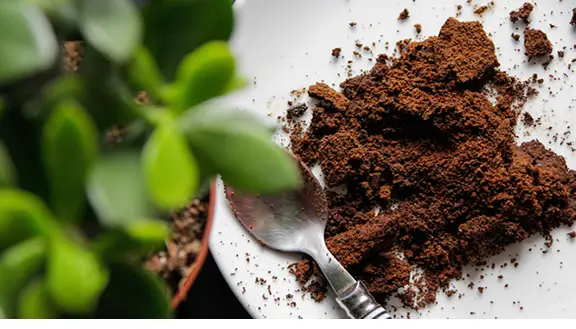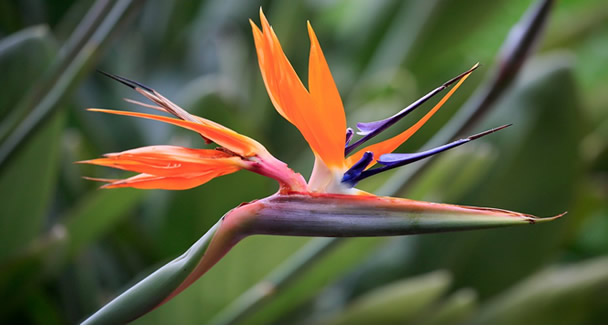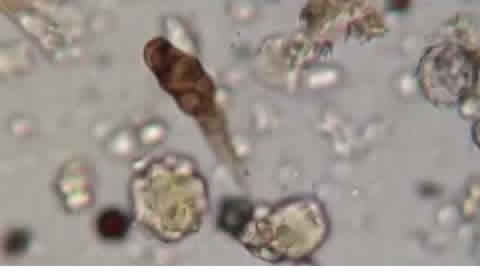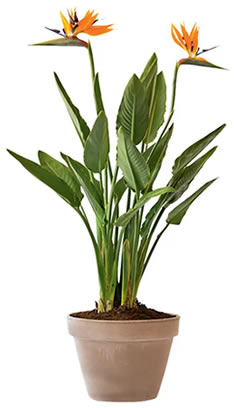Strelitzia reginae, more commonly known as Bird of Paradise, is a beautiful flowering plant perfect for both outdoor and indoor use. With its stunning bird-like flower this plant looks stunning in any garden or indoor space.
Care of the plant requires a different approach depending on if it is an indoor plant or an outdoor one. Often the question arises, are coffee grounds good for a bird of paradise? Let’s answer that question now.
Table of Contents
- The Problem With Using Coffee Grounds On Bird Of Paradise
The Problem With Using Coffee Grounds On Bird Of Paradise
Coffee grounds are not good for bird of paradise.
When you use ground coffee for bird of paradise you may see immediate beneficial effects but it will damage the plant in multiple ways in the long-term.

Although it is possible to use coffee grounds as a bird of paradise fertilizer in a very sparing way, I strongly advise against it!
The negative effects of coffee grounds on a bird of paradise plant well outweigh any immediate benefits you may see.
For example, coffee grounds can help to produce more nitrogen in the soil organically.
But because they also contain anti-bacterial agents too much will kill beneficial microbes in the soil leading to a loss of plant nutrients and nitrogen.
Fertilizing bird of paradise
The bird of paradise plant, formal name strelitzia reginae but also known as the crane plant, is a beautiful colorful plant.
It grows happily both indoors in a pot and outdoors in the garden.
It gets its names from its uncanny resemblance to an exotic bird and a crane.
The strelitzia reginae plant originates in South Africa and is a species of evergreen tropical herbaceous plant.
Outdoor and indoor plants can grow as high as 2 meters.
The bloom of a bird of paradise plant is bird-like with striking orange or yellow petals that are mixed with deep purple and red, mimicking the flamboyant plumage of tropical birds.
Indoor bird of paradise require a slightly different feeding schedule to outdoor plants but for the most part these blooming plants are fairly easy to care for but do require regular fertilization.
Most bird of paradise plants are bought fully grown as it takes up to five years to take one from seed to its first bloom.
When it comes to feed and fertilizer, a bird of paradise plant will thrive on a good quality granular fertilizer outdoors and a good quality tropical plant fertilizer
for indoors.
But what about using coffee grounds?
The scary truth about using coffee as bird of paradise fertilizer
There is a lot of circumstantial evidence to suggest that coffee grounds have a very beneficial effect on plant growth.
However, there are also disadvantages to using it that have been highlighted in scientific studies.
 If you intend to use ground coffee on your bird of paradise (or any other plant), which is either an outdoor plant or an indoor one, I suggest you do it very sparingly for the reasons given below.
If you intend to use ground coffee on your bird of paradise (or any other plant), which is either an outdoor plant or an indoor one, I suggest you do it very sparingly for the reasons given below.
I will not use coffee at all also for the reasons given below.
Before I go into the positives and negatives associated with using coffee grounds on both indoor and outdoor plants I have to bust a common myth about the benefits of using it.
Myth: Coffee grounds help reduce the pH value of the soil: Wrong!
Although most of us consider coffee to be acidic, it is in fact fairly pH neutral.
So adding it to soil will not effect the soil’s pH value in the slightest
Unfortunately, this is not the only misconception people have about the benefits of coffee.
I will highlight all the reasons why I think you should not use coffee on you bird of paradise plant as we progress through this article.
Let’s first look at the perceived benefits of using ground coffee on plants.
Perceived pros of using coffee grounds for bird of paradise and the true cons
Below I will highlight both the positives and the negatives of using coffee grounds and coffee products as fertilizer on a bird of Paradise plant.
Perceived positives of using coffee on bird of paradise
- Coffee can act as an organic fertilizer. Both indoor and outdoor plants can benefit to some extent from coffee grounds.
- Coffee can help feed beneficial worms in the soil. Like microbes in the soil, worms are very beneficial to the garden and they love coffee.
- Can act as a natural pesticide. The effectiveness of using coffee to kill slugs and snails in the garden, along with other pests, is actually up for debate. There is some circumstantial evidence that coffee grounds will repel, or even kill slugs and snails, however there is stronger experimental evidence to suggest it has no effect on them at all. There are much more effective ways of getting rid of slugs and snails in the garden.
- Coffee can act as a pet repellent. Many gardeners claim that using coffee grounds as a mulch helps to keep away curious pets, like cats who love to dig up plants.
- Coffee grounds can restrict weed growth. Coffee has been shown to greatly reduce the growth of weeds in the garden. However, those same effects are taking place on other plants in the garden and your bird of paradise (both indoors and outdoors).
True negatives of using coffee on plants (even when used sparingly)
- Coffee is anti-bacterial. Although it may help to kill slugs in an outdoor garden it will rob both indoor and outdoor plants of much needed nutrients. It is the micro-organisms in the soil that convert organic matter into the nutrients and minerals that plants thrive on. Coffee will kill these tiny beneficial creatures and rob your plant of nutrients.
- Coffee has some allelopathic properties. Some plants, including vegetables, will be adversely affected by adding coffee grounds to the surrounding soil.
- The caffeine in coffee suppresses plant growth. This scientific study tells you everything you need to know about how coffee negatively affects the growth of plants.
- Ground coffee is not a good mulch. Coffee will compact and restrict air and water from penetrating the soil.
Why it’s better to avoid using coffee altogether
As you can see, coffee offers both benefits and drawbacks when it comes to using it as a plant fertilizer.
In my opinion the drawbacks, and potential soil and plant damage that coffee can cause, well outweigh the benefits.
In fact, the commonly believed benefits of using coffee are often highly debated.
For example, as I mentioned above, the effectiveness of coffee as a snail and slug repellent seems to be based on an urban myth as recent experiments have shown it has no effect on these pests at all.

It is true that microbes in the soil will munch there way through ground coffee, releasing much-needed nutrients and nitrogen into the soil.
However, too much of the stuff will kill those very same microbes because coffee has anti-bacterial agents in it.
There are easier ways to add nutrients and nitrogen to the soil that don’t involve taking the risk of damaging your plant.
So, in my opinion you should avoid using coffee grounds in and around your bird of paradise plant.
If you do plan to use them then do it very sparingly, adding only a small amount every few months.
I personally just avoid using it altogether as it’s just too risky to get the correct quantity exactly right so you get all the benefits but none of the drawbacks.
Why you should use granular organic fertilizer instead of coffee grounds
Strelitzia reginae, bird of paradise, is a plant that is easy to grow and cultivate.
This plant is very tolerant of the cold and very resilient, making it a great outdoor plant.
However, it is also an excellent, and very aesthetically pleasing indoor plant.
Outdoor and indoor bird of paradise plants require slightly different care and feeding routines.
Fertilizing an outdoor bird of paradise plant
For outdoor bird of paradise plants start by watering the plant before you apply a good quality granular fertilizer.
Water the plant again after applying the granular fertilizer.
You should avoid fertilizer getting onto the leaves of your plant.
If you accidentally get fertilizer on the plant leaves gently wipe it off with a wet cloth.
Feed the bird of paradise every 3 months during the growing season.
Fertilizing an indoor bird of paradise plant
Indoor bird of paradise plants require more feeding than outdoors plants because there is less organic action taking place in the nutrient cycle within the soil.
For indoor bird of paradise plants fertilize them every 2 weeks during the growing season.
You should also feed them during the winter but only once per month.
A granular feed works well though enough on an indoor bird of paradise though you may want to consider using a good slow release indoor tropical plant fertilizer instead.
When dead leaves and old flower stalks appear on a bird of paradise it is best to prune them off.
Removing these will not only make your plant look better but it will dramatically reduce the chance of any fungal organisms growing on the dead tissue.
Takeaway
Coffee grounds can be used as a fertilizer on bird of paradise plants, both the indoor and outdoor kind.
However, I personally do not advise it.
 If you do decide to go ahead and add ground coffee to your plant, you should add it sparingly.
If you do decide to go ahead and add ground coffee to your plant, you should add it sparingly.
Although ground coffee can help a plant to thrive too much of it can cause damage to the soil in which the plant lives which will effect the health and growth of your plant.
There are also misconceptions about just how effective ground coffee is as a fertilizer anyway.
It is true that it can help to add to add nutrients and nitrogen to the soil, as microbes break it down, however too much of it can actually kill those same microbes.
As you can see, although adding coffee grounds to your bird of paradise plant can have some beneficial effects, getting the amount right and the schedule of adding it correct is tricky business.
So, for that reason I suggest you completely avoid using it.
If you do plant to add coffee grounds to your bird of paradise, or any other indoor or outdoor plant, do it only once every few months and only add a small amount.
In my opinion, it is much better to use a good granular organic fertilizer that has been developed specifically for outdoor blooming plants for your garden bird of paradise.
Use a good tropical plant fertilizer that has been formulated for tropical plants on your indoor bird of paradise.
If you are in any doubt about your ability to judge how much coffee grounds are good for your bird of paradise plant and how much are bad, then I suggest you simply use coffee for drinking and a proper plant fertilizer to cultivate your plants!

